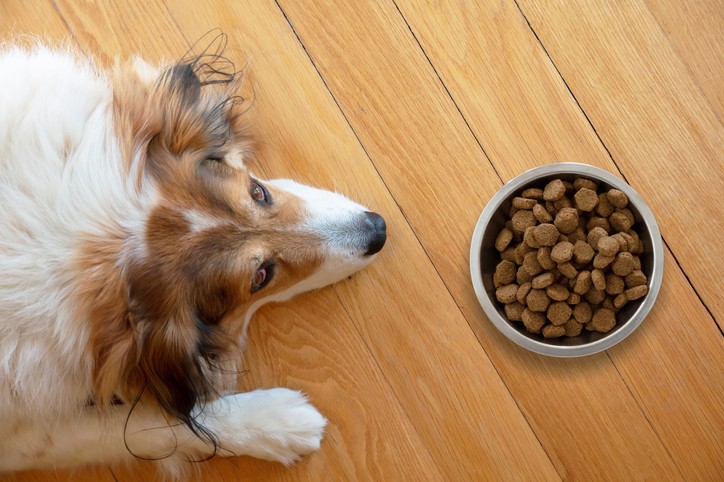
Why is My Dog Not Wanting to Eat?
As a dog pet parent, you’re always paying attention to your pet’s health and wellness needs, and you’re sure to notice when they are not behaving properly, too. When your dog is uninterested in food, this typically sets off alarm bells in your mind, and it may indicate a serious underlying health problem.
In the article below, we’ll help you learn more about some of the potential causes of disinterest in food in your dog. Although some problems are mild and easy to solve, others may be serious, and it’s important to figure out what’s going on when your pet doesn’t want to eat.
Mild Causes of Your Dog Not Wanting to Eat
Your dog might not want to eat because they are picky, bored, upset stomach or more.
Pickiness
Some dogs are naturally just picky. If you have a picky eater, you may find that your dog stops wanting to eat the food they are used to after a short time. You should try varying the food when this happens to see if it might help.
Boredom
If your dog gets bored with the same flavor or texture in the food, this may also cause them to stop wanting to eat as much. Try changing the food to a different flavor, texture, or both—or try mixing wet and dry food together to see if this makes a difference.
Sudden Food Change
Any sudden changes in your dog’s food may cause them to stop wanting to eat. If your dog has been used to a specific blend and the company no longer makes this type of food anymore, for example, they may be uninterested in trying something new.
Mild Stomach Upset
Some dogs may have mild stomach upset for a variety of reasons. These problems typically go away within 24 hours, but they can cause a short-term lack of food interest. If the problem clears up on its own within a day, this is nothing to worry about.
Moderate Causes of Food Disinterest in Dogs
Food allergies, stuffy nose or a medication side effect could be some other reasons for your dog not wanting to eat their food.
Food Allergy or Intolerance
If your dog is allergic to or intolerant of an ingredient in their food, they may have an upset stomach or itchy skin after eating it. This may cause your dog to be uninterested in the food and less likely to want to eat it, even if they don’t realize the true cause of the problem.
Stuffy Nose
Dogs with respiratory conditions that cause them to have a stuffy nose or congestion in the sinuses may be uninterested in food. This is simply because they can’t smell it. Once your dog’s stuffiness has cleared up, they will be likely to want to eat again, but you can give them something with a strong smell to help in the meantime.
Medication Side Effect
Some types of medications may cause dogs to be uninterested in food for a short time. If your dog is on a long-term medication that has this side effect, you may need to talk to your veterinarian about getting your dog some appetite stimulating food instead.
Severe Causes of a Dog Not Eating
Talk with your Boston Veterinary Clinic veterinarian if your dog is not eating because of pancreatitis, digestive disease, a dental issue, or a chronic health problem.
Pancreatitis
Pancreatitis is a serious and potentially life-threatening condition in dogs. It may flare up when dogs eat food that is too high in fat for them to digest properly. This condition causes severe nausea, vomiting, and diarrhea, sometimes with blood in the stool or vomit. It can lead to dehydration quickly.
Digestive Disease
Any type of digestive disease has the potential to cause a dog to be uninterested in food. If you’ve ever had a stomach virus, you understand how this can happen. However, severe digestive diseases can also cause this problem, so it’s important to have your pet checked by the vet if you think they may have something like this.
Dental Issue
Dental issues may be moderate to severe, but they typically cause dogs to stop wanting to eat because of pain from chewing. If your dog has something wrong with their gums or teeth, or if they have an abscess in their mouth, your pet may stop wanting to eat very much as a result.
Chronic Health Problem
Chronic health problems—such as cancer, chronic pain, and more—may contribute to a lack of food interest in dogs. If your dog is very sick or doesn’t feel well, they will naturally be less likely to want to eat than they would otherwise.
Talk with Your Boston Veterinary Clinic Vet
Mild to moderate problems with eating may be able to be resolved on your own at home, or with minimal extra care from the vet. However, severe problems that cause your dog to be disinterested in food will require vet care and may even need a trip to the emergency vet, depending on the issue.
By taking the time to figure out how severe your dog’s eating issue might be, you can choose when it’s time to see a vet and when you can handle the issue at home on your own.
Book an appointment online at Boston Veterinary Clinic if you need to talk with a vet about your dog not wanting to eat.